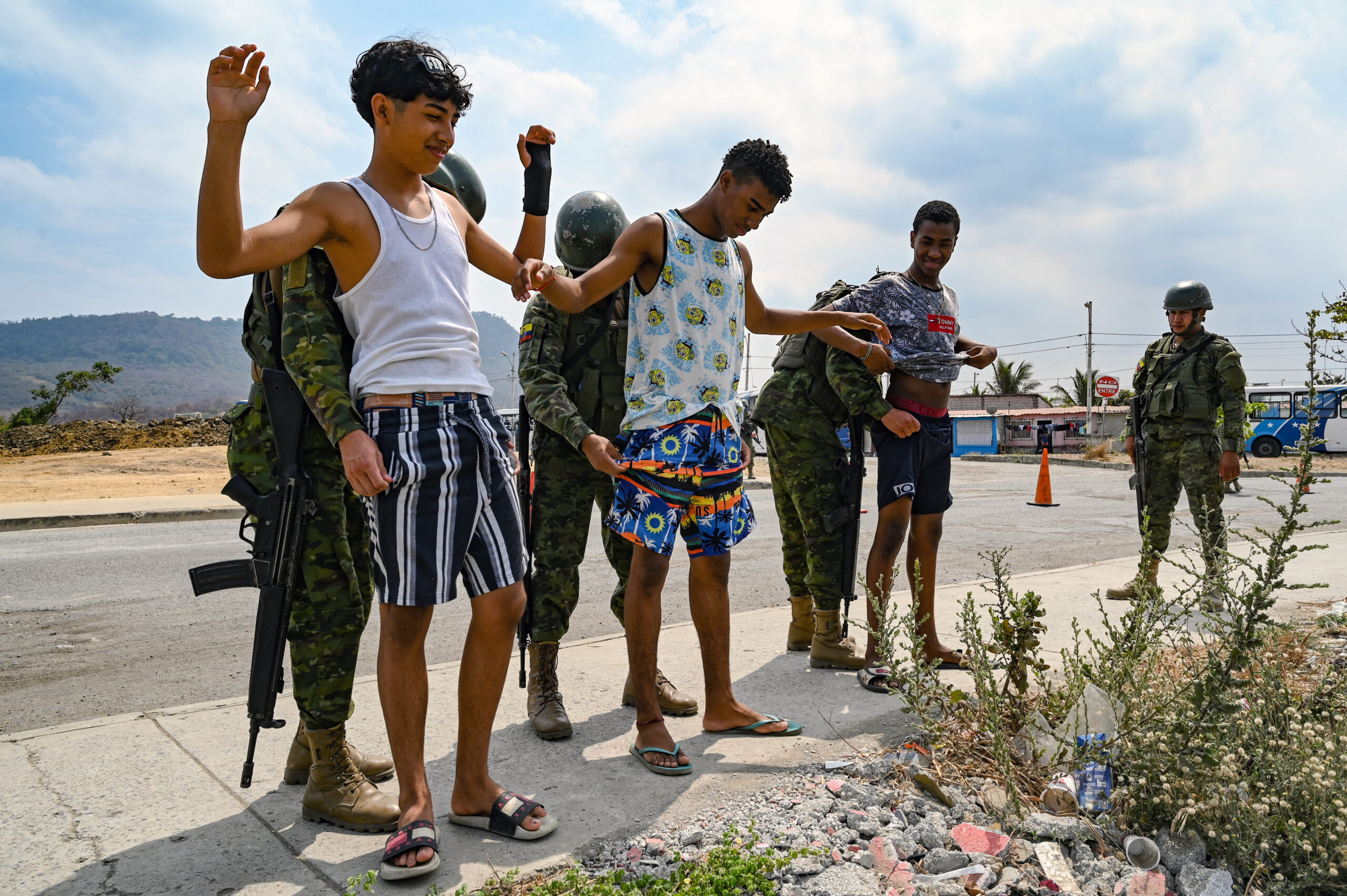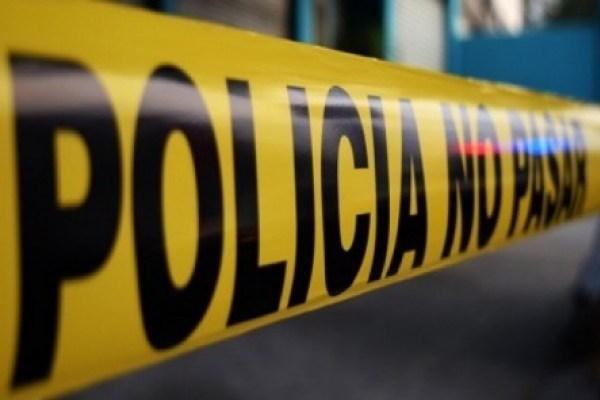International
Guayakill: Ecuadoran port city torn apart by gangs

| By AFP | Héctor Velasco and Karla Pesantes |
Entire neighborhoods run by gangs, prison bloodbaths and police overwhelmed by criminal firepower: Drug trafficking has transformed the Ecuadoran city of Guayaquil into a den of violence.
The port city of 2.8 million people, which on Saturday hosts the final of the Copa Libertadores competition, has witnessed scenes of incredible barbarity in recent years.
Hundreds of inmates have been killed — many beheaded or incinerated — in numerous prison battles, and civilians have increasingly gotten caught up in the gang war rocking the city rebaptized “Guayakill” by inhabitants.
So far this year, the commercial heart of Ecuador has seen 1 200 murders — 60 percent more than in 2021 according to official data.
Since last year, almost 400 inmates have died in several cities, most of them in Guayaquil, which has also been hit by a spate of car bombs and shocking scenes of bodies dangling from bridges.
And despite the government declaring states of emergency to allow for troop deployment and boosting police numbers in Guayaquil by over 1 000 to nearly 10 000, some fear it is a losing battle.
“We used to confront small arms… revolvers. But now on the streets we face American (automatic) rifles, grenades, explosive devices,” police forensics official Luis Alfonso Merino told AFP.
“The violence has grown enormously.”
Rifles, grenades
Once a relatively peaceful neighbor of major cocaine producers Colombia and Peru, Ecuador was long merely part of the drug transit route.
But recently, traffickers with suspected links to Mexican cartels such as Sinaloa, the Gulf Clan and Los Zetas have been expanding their domestic presence — fighting over the fast-growing local market and access to the port of Guayaquil for exports to Europe and the United States.
The city’s prisons, where gangs also battle it out for supremacy, are emblematic of the fast-declining security situation.
In one of the deadliest riots in Latin American history, 122 people were slaughtered at the infamous Guayas 1 penitentiary in September last year in an hours-long rampage by inmates wielding guns, machetes and explosives.
“The State does not govern the prisons,” Billy Navarrete of the CDH human rights NGO told AFP.
Instead, they are under the control of “criminal organizations with the complicity of law enforcement agents who allow, tolerate and enrich themselves with arms trafficking,” he said.
The government has announced it was stepping up enforcement. In 2021, it reported a record haul of 210 tons of drugs.
So far this year, the figure stands at 160 tons.
In a 2019 report, Ecuadoran intelligence said there were at least 26 criminal gangs fighting for control of the lucrative drug market, but officials have since said the number is likely higher.
And according to operations chief Major Robinson Sanchez in Guayaquil, the gangs are “better armed than the police.”
Wolves vs Eagles
At the entrance to Socio Vivienda II, an impoverished housing development and one of the most dangerous places in Guayaquil, police and soldiers stand guard.
Two dozen others in black uniforms, bulletproof vests and balaclavas patrol the narrow streets on motorcycles.
Some 24 000 people live in Socio Vivienda’s three sectors in the crossfire of the gang war that has resulted in several public shootouts since 2019 and forced school closures in recent weeks.
The gangs go by names such as Lobos (Wolves) and Tiguerones. The Aguilas (Eagles) are based higher up on the hill.
When the groups first started going head to head, the community itself erected metal gates at the ends of streets to prevent gang members from moving freely about.
But police removed these for ease of access, and now “the bullets zoom from one end to the other,” said a community leader, 45, who spoke on condition of anonymity in an atmosphere of fear.
‘Zombies’ and sentinels
Patrolling officers stop at a house in Socio Vivienda and enter by force.
They find no drugs, only three youngsters with “Tigueron” tattooed onto their arms. It is not enough to detain them.
The gangs use children as young as 10 as sentinels or informants, residents and police say.
As they “rise” in the organization, they earn the right to get tattooed — but not without having committed a crime.
On the streets, it is common to see doped-up consumers of “H” — a heroin residue sold for 25 cents per gram. They are known locally as “zombies.”
The community leader told AFP that luxury vehicles moved in and out freely, transporting drugs right under the noses of police.
And as fearful families leave the neighborhood, gang members immediately “move in” to their homes, he added.
So far this year in Socio Vivienda II alone, records show 252 killings, up from 66 in 2021.
On the weekend preceding Saturday’s Libertadores clash between Brazilian teams Flamengo and Athletico Paranaense, 21 murders were reported in Guayaquil.
Some 50 000 foreign fans are expected to turn out for Saturday’s final.
International
Football Fan Killed in Clashes After Colombian League Match

Fans of Cúcuta Deportivo and their traditional rivals Atlético Bucaramanga clashed outside the stadium following their local league match on Tuesday, leaving one supporter dead and several others injured.
The deceased fan was stabbed, according to a senior police official in Cúcuta who confirmed the cause of death in a video statement. Local media reported that the victim was a supporter of the visiting team, Atlético Bucaramanga.
The match ended in a 2-2 draw. Authorities had banned the entry of Atlético Bucaramanga’s organized supporters into the stadium in an effort to prevent disturbances.
Despite the restrictions, violence broke out in the surrounding areas after the game. Among the injured were three police officers, an institutional source told AFP.
The incident adds to a series of recent violent episodes linked to Colombian football. The most recent occurred in December, when supporters of Atlético Nacional and Independiente Medellín clashed in the stands and on the pitch, leaving 59 people injured.
International
Missing Spanish Sailor Rescued After 11 Days Adrift in Mediterranean

The man had departed from the port of Gandía, on Spain’s eastern coast, with the intention of reaching the southern Spanish town of Guardamar del Segura, a journey of about 150 kilometers, a spokesperson for Spain’s maritime rescue service told AFP.
Search boats and aircraft were deployed on January 17, but the operation was called off on January 22 after efforts proved unsuccessful. Alerts were then issued to vessels navigating the area in case they spotted any signs of the missing sailor.
As hopes were fading, a surveillance aircraft from the European Union’s border agency Frontex spotted the sailboat on Tuesday, along with a person signaling for help, approximately 53 nautical miles northeast of Bejaia, Algeria.
A nearby vessel, the Singapore-flagged bulk carrier Thor Confidence, carried out the rescue and is expected to bring the man to an end to his ordeal when it arrives on Thursday in the southern Spanish port city of Algeciras.
Maritime rescue services shared images on social media showing a small white sailboat drifting at sea and secured alongside the much larger ship.
It remains unclear how the sailboat ended up hundreds of kilometers off its intended route or how the man managed to survive for so long alone in open waters.
International
Rubio Says U.S. Could Participate in Follow-Up Russia-Ukraine Talks

The United States could join a new round of talks this week aimed at ending Russia’s invasion of Ukraine, Secretary of State Marco Rubio said on Tuesday.
Teams from Kyiv and Moscow met last Friday and Saturday in Abu Dhabi in their first publicly acknowledged direct negotiations to discuss the peace initiative promoted by former U.S. President Donald Trump.
“They are going to hold follow-up talks again this week,” Rubio told the Senate Foreign Relations Committee. “There could be U.S. participation.”
However, Rubio suggested that Washington’s role may be more limited than during last week’s discussions, which included Steve Witkoff, the president’s special envoy, and Jared Kushner, Trump’s son-in-law.
The secretary of state indicated that progress may have already been made on security guarantees for Ukraine, one of Kyiv’s key demands in any agreement with Moscow after nearly four years of Russian invasion.
“There is one remaining issue that everyone is familiar with, and that is the territorial claim over Donetsk,” Rubio said, referring to the eastern Ukrainian region that Russia wants Ukraine to cede.
“I know that active efforts are underway to see whether the positions of both sides on this issue can be reconciled. It remains a bridge we have not yet crossed,” he added during the hearing.
Rubio acknowledged that the territorial question would be particularly difficult for Ukraine to resolve.
-

 Central America2 days ago
Central America2 days agoGuatemala seizes over a ton of cocaine hidden in flour at Pacific port
-

 International5 days ago
International5 days agoTrump-Era Defense Plan Prioritizes Border Security and Scales Back Global Commitments
-

 International5 days ago
International5 days agoBogotá and Quito Seek Dialogue After Tariffs and Power Cut Escalate Tensions
-

 International4 days ago
International4 days agoDelcy Rodríguez seeks political agreements after Maduro’s ouster
-

 International2 days ago
International2 days agoSpain’s irregular migrant population rises to 840,000, study finds
-

 International2 days ago
International2 days agoHistoric snowstorm paralyzes Toronto after 60 centimeters of snow
-

 International4 days ago
International4 days agoFederal immigration agents kill man in Minneapolis, sparking protests and outrage
-

 Central America1 day ago
Central America1 day agoGuatemala Police Arrest Prison Guard Caught in the Act of Extortion
-

 Central America1 day ago
Central America1 day agoHonduras swears in conservative president Asfura after disputed election
-

 Central America1 day ago
Central America1 day agoBukele leads public trust rankings as UCA survey highlights gains in security
-

 International1 day ago
International1 day agoDoomsday clock moves to 85 seconds before midnight amid rising global risks
-

 International1 day ago
International1 day agoWinter Storm Fern Leaves 30 Dead and Over One Million Without Power Across the U.S.
-

 Sin categoría1 day ago
Sin categoría1 day agoEight Killed in Series of Armed Attacks in Ecuador’s Manabí Province
-

 International2 days ago
International2 days agoRights group says nearly 6,000 killed in Iran protest crackdown
-

 International1 day ago
International1 day agoSpain approves plan to regularize up to 500,000 migrants in Historic Shift
-

 International2 days ago
International2 days agoVenezuela frees at least 80 political prisoners, NGO says
-

 Sin categoría1 day ago
Sin categoría1 day agoEl Salvador Launches Fourth Year of Ocean Mission to Protect Marine Ecosystems
-

 International2 days ago
International2 days agoEU launches new probe into X over AI-generated fake nude images
-

 International4 hours ago
International4 hours agoMissing Spanish Sailor Rescued After 11 Days Adrift in Mediterranean
-

 International4 hours ago
International4 hours agoRubio Says U.S. Could Participate in Follow-Up Russia-Ukraine Talks
-

 International4 hours ago
International4 hours agoFootball Fan Killed in Clashes After Colombian League Match
-

 International2 days ago
International2 days agoSevere winter storm grips U.S., leaves multiple dead as extreme cold persists
-

 International2 days ago
International2 days agoFrance debates ban on social media for children under 15
-

 Central America4 hours ago
Central America4 hours agoGuatemala President Says Starlink Terminal Found Inside Prison


























